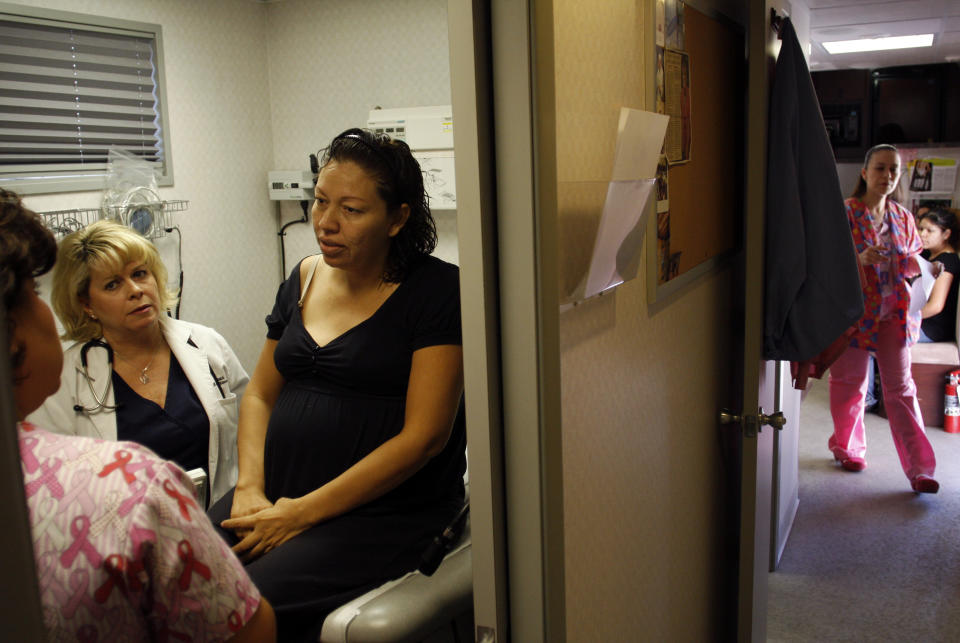Obamacare was revolutionary for women's health. The progress is now in danger.
Women’s health has come a long way since the March 2010 passing of the Affordable Care Act (ACA), also known as Obamacare.
But President Obama’s signature legislation has faced a political and legal onslaught in the years since. And American society may now be shifting toward a view that would imperil freedom of choice in women’s health.
“More and more laws are treating a fetus as a person, and a woman as less of one, as states charge pregnant women with crimes,” the New York Times editorial board wrote recently. The series of reports on women’s health concluded: “If a fetus is granted equal rights, women who become pregnant may find their most personal decisions coming under state control.”

‘The ACA established a floor’ for women’s health
In 2008, nearly 17 million women did not have health insurance. Those numbers changed with the implementation of the ACA in 2010. By 2016, that number dropped to 10.5 million.
“There have been a lot of different forces in play, but in terms of women’s coverage and access to care, one of the most sweeping changes was the enactment of the Affordable Care Act,” Usha Ranji, associate director of Women’s Health Policy for the Kaiser Family Foundation, told Yahoo Finance.
“The ACA established a floor, a minimum level of benefits that helped to cover,” Ranji explained, emphasizing how different things were before the arrival of Obamacare. “[N]ot many benefits categories were required to provide coverage in private health plans. … [N]ow all new private health plans have to have maternity coverage. It didn’t used to be that way.”
Obamacare implemented several crucial initiatives in terms of women’s health care. Specifically, the law banned insurance providers from charging women more than men for coverage and required that maternity and newborn care be a mandatory benefit “for individual market health plans.”
“People who didn’t used to qualify for Medicaid can now purchase coverage,” Ranji said. “This was a major expansion in health coverage, and we see that now with the huge drop in the uninsured rate.”

One of the biggest changes over the last decade in women’s health care, Ranji added, has been the requirements for coverage of services.
“The benefits changes are hugely important,” Ranji said. “Before the ACA was enacted, particularly in the individual market, there were lots of gaps. Plans were allowed to deny coverage for those with preexisting conditions, like pregnancy. Or, if you bought one of those plans and got pregnant, you might not have coverage for maternity services, meaning significant out-of-pocket costs.”
Ranji said she’s also seen a “huge rise” in the share of women who don’t have to pay out of pocket for contraceptives.
If the ACA were to be officially repealed, “We go back to a time when women were rated based on their gender and their preexisting conditions,” Sara Collins, vice president of health care coverage and access for the Commonwealth Fund, told Yahoo Finance. “This could have multiple implications.”
‘That’s what’s at stake: people’s lives’
The Trump administration has tried to roll back Obamacare generally and women’s health initiatives specifically. One initiative is a proposed Title X of the Public Health Service Act, which critics call a “gag rule.” The rule would not only withhold funds from organizations that provide abortion services but would also place restrictions on abortion counseling and referrals.
“That gag rule could affect four million patients across the country,” Planned Parenthood President Dr. Leana Wen told Yahoo Finance. “It’s just one more attack on women’s health care.”
Planned Parenthood has also come under fire in recent years by conservative politicians seeking to defund the organization.
“It’s been one attack after another when we’re just trying to provide health care,” Wen said.

And with Supreme Court Justice Brett Kavanaugh now on the bench, Wen anticipates facing a situation in which “Roe v. Wade could be overturned or further eroded.” That said, despite his conservative leanings on the issue, Kavanaugh provided a crucial vote in December declining to hear a Supreme Court case involving Planned Parenthood.
“These cases mean we could face a situation where 25 million could be living in states where abortion is banned or criminalized,” Wen said. “That’s what I think about, because for me as a doctor, this is deeply personal. I’ve treated patients who came to the ER because of medical illness but what made them sick wasn’t disease; it was lack of access to health care. That’s what’s at stake: people’s lives.”
Based on the latest split rulings, some states are currently able to terminate Planned Parenthood from Medicaid.
“There is this problem that I’m deeply troubled by, which is that reproductive health and women’s health care is singled out, stigmatized and attacked in a way that we don’t see happening to any other aspect of health care,” Wen said, citing the gag rule as one example.

‘Unqualified’ HHS appointees
Cindy Pearson, executive director of the National Women’s Health Network, criticized the fact that Trump appointed pharmaceutical executive Alex Azar to lead the Department of Health and Human Services (HHS).
“Azar has packed it with appointees not qualified for their jobs,” Pearson said. “Many have credentials only about their past work in anti-abortion and anti-contraceptive groups. Their policies aren’t good for women’s health. They don’t even accurately describe the science of contraception, and that’s been really tough for women’s health.”
Pearson added that these HHS appointees are part of what’s behind the growing number of regulations “that pull back federal support for family planning and put in place new regulations that roll back some of the guarantees women had.”
These guarantees were in place so that women wouldn’t be discriminated against based on their sexual orientation or choice of services and so that there would be more “federal muscle behind their right to get coverage wherever they work or receive services.”

In November 2018, the HHS, supported by the Trump administration, provided an “exemption from the contraceptive coverage mandate to entities that object to such coverage based on religious beliefs,” CNN reported. A second rule gave exemption to “nonprofit organizations and small businesses that may have non-religious moral convictions to such coverage,” according to CNN.
“Can you imagine that happening to other aspects of women’s health care?” Wen said of the politically driven regulations. “That politicians instead of doctors and scientists are the ones telling our patients what to do? There’s no place for politics in exam rooms in any aspect of health care, but especially in women’s health care.”
‘States or insurers could say, “We don’t believe the law”’
A recent legal ruling will ensure that Obamacare is a relevant issue going forward.
On Dec. 15, 2018, a Texas judge ruled that Obamacare’s mandate was unconstitutional. Judge Reed O’Connor agreed with plaintiffs who argued that the lack of a penalty invalidated the “individual mandate” provision of the law and, if that part of the law was now invalid, then the whole law was.
After an expected appeal, the Texas case will likely take months or years to play out, and the Supreme Court could end up ruling on the matter. In any case, experts say it could continue to erode certain benefits of the health care law.
The ruling “could have a very serious effect even if it has no legal effect at this point,” ACA expert Tim Jost said on recent a phone call with reporters. “States or insurers could say, ‘We don’t believe the law is in effect anymore and we don’t want to enforce it.’”
Adriana Belmonte is an associate editor for Yahoo Finance. Follow her on Twitter @adrianambells.
READ MORE:
The latest GOP assault on Obamacare might boost its popularity even more
Suze Orman: Kavanaugh’s Supreme Court confirmation is a ‘devastating blow for women’
‘Troubling and shocking’: Americans are increasingly crowdfunding medical costs
Follow Yahoo Finance on Twitter, Facebook, Instagram, Flipboard, LinkedIn, YouTube, and reddit.
